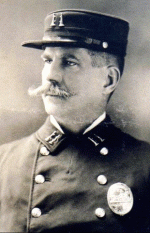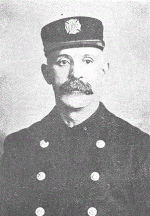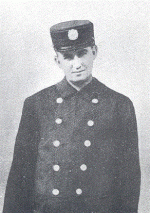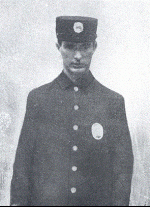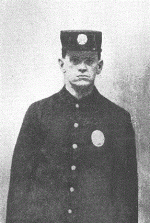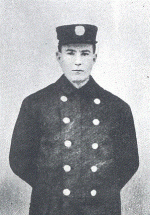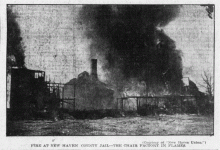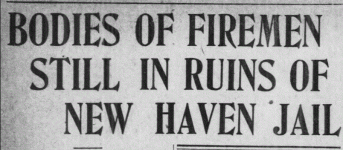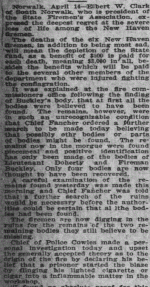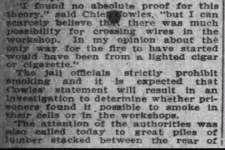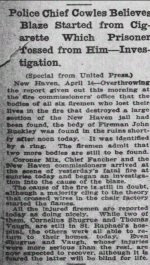
April marks 100th anniversary of New Haven Fire Department's worst tragedy
William Kaempffer, Register Staff
April 21, 2010
Flames and smoke can be seen from the April 13, 1910, fire at the old County Jail on Whalley Avenue. Contributed photo
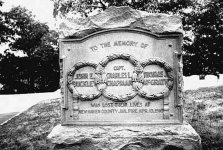
NEW HAVEN -- John DePonte still says prayers for his dead uncle and five other firefighters who died 100 years ago this month in the Fire Department's worst tragedy.
Trapped by metal doors and barred windows, six firefighters burned to death in a massive fire April 13, 1910, at the old County Jail on Whalley Avenue. Five other firefighters were seriously injured in what remains the greatest single loss of firefighter life in department history.
The dead were Capt. Charles L. Chapman, 51; Lt. William Doherty, 51; ladderman John Buckley, 30; horseman James Cullen, 34; James Mortell, 30; and Thomas McGrath, 33, both of Engine Company 4.
"This has been a most terrible affair," Mayor Frank Rice, just months in office, said the night of the tragedy, even as workers continued to comb debris for the missing. "I cannot express my sorrow over the death of those brave firemen."
Indeed, emotional news reports from the day recounted acts of heroism and raw emotion from men who watched colleagues die terribly.
When the fire was discovered in a storeroom, prisoners working in the workshop building chairs were sent back to their cells and the adjacent jailhouse. The threat at the time didn't seem immediate and the fire had burned for about an hour when the warden ordered an evacuation.
While that was still happening, however, a half-dozen firefighters rushed into the jail office and frantically announced three of their colleagues were trapped on the third floor of the prison chair shop and were burning to death. The news would continue to get worse.
A few minutes before, Fire Chief Rufus Fancher had been through the doomed shop and saw no fire and little smoke, he said after the tragedy. That quickly changed when, with about 10 firefighters in the building, an exploding gas tank caused a backdraft that slammed shut the metal door, trapping the men, and fire quickly swept through.
https://www.nhregister.com/news/article/New-Haven-school-board-OKs-3-admin-hires-17076344.php
Three firefighters made their way to the barred windows. They pressed their faces to the bars and shouted for help. Co-workers outside swung picks to no avail. Others sprayed water on the trapped men's extended hands as fire closed in behind them.
Doherty, Cullen, Mortell and ladderman Cornelius Shugrue fled the fire to the basement looking for air. With flames already catching their clothing and no way out, the men made a final effort to get up to the roof.
Shugrue was the first up and turned to help Doherty. He held his wrist as long as he could and then, he would later say, watched Doherty drop back into the flames. He couldn't see his two other companions.
He then crawled to the edge of the building and jumped. He was found by his colleagues two hours later.
Three others, hemmed into a corner, burned where they stood.
Hope also seemed lost for the three at the window when they would receive a fiery reprieve. The roof collapsed behind them, opening an escape route down ladders raised by other firefighters.
"These firefighters were literally trapped behind bars," said current Fire Chief Michael Grant, adding the loss of someone in the fire service, be it in 1910 or 2010, is a tragedy.
"In the fire service, everybody dies a little when somebody in our family dies."
Retired Battalion Chief Edward Flynn, a department historian, recently said several stories in particular stood out during his research of the tragedy. One was the account of two young brothers waiting at the corner of St. John Street, which was their habit since their mother died the year before, for their firefighter father's shift to end. The engines returned. He did not.
The other, Flynn said, was the story of a survivor. Thomas Vaugh was only 24 when a container of varnish exploded, terribly burning his face. As he ran out, he dipped his hands into what he thought was a vat of water to put on his burned face. But that vat contained hot varnish, too.
Doctors didn't expect him to survive, but he lived, his face disfigured and both hands lost to amputation.
"From what I've read, he wore a cloth mask over his face for the rest of his life," said Flynn. "If there's any story of the suffering in that fire. ... He lived a nightmare. The other ones died, but he lived a nightmare."
DePonte, 86, is the nephew of fallen firefighter Thomas McGrath. Another uncle, Bill, was on the job, too, assigned to the same firehouse. From what DePonte could piece together from family stories, Bill McGrath was given a different assignment that day "or he would have been missing, too."
The fire happened on the birthday of DePonte's mother, Ellen, sister of Thomas and Bill McGrath.
"My mother never got over it in all these years," he said last week. "She would talk about it all the time. She took it so very hard.
"Every time a fire apparatus would go by and she would hear the siren, she would go in the other room and say a prayer. Through the years, she carried all this pain.
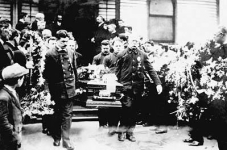
NEW HAVEN -- John DePonte still says prayers for his dead uncle and five other...

www.nhregister.com
"She'd always remind me, 'Whatever occupation you want to do, you'll never apply to be a firefighter,'" DePonte, of East Haven, said.

